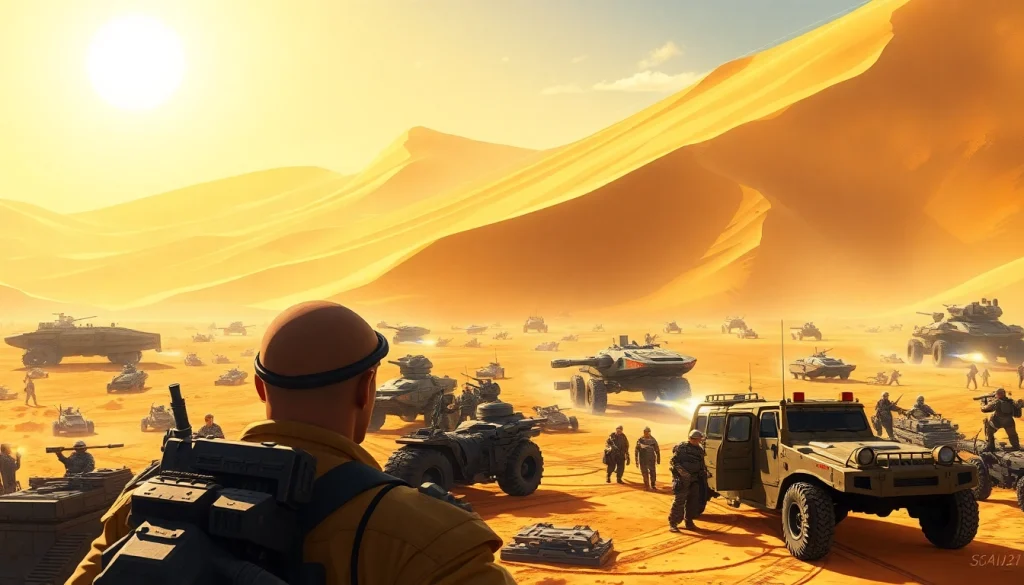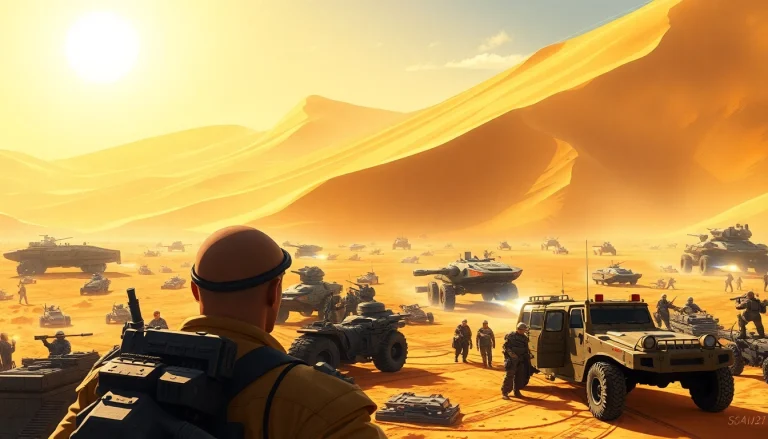
Introduction to the Dune 2 Game Experience
Dune 2, often hailed as a pioneer in the real-time strategy (RTS) genre, continues to captivate gamers with its rich gameplay and strategic depth. Released in 1992 by Westwood Studios, this game not only laid the foundation for countless sequels and derivatives, but it also influenced the development of many modern strategy games. Players who delve into the dune 2 game are transported to the universe of Frank Herbert’s Dune, where they command factions in a battle for control over the desert planet of Arrakis.
Understanding the Basics of Dune 2
The primary objective in Dune 2 is straightforward: harvest spice, build your forces, and defeat your opponents. However, the strategic demands of the game require more than just brute force. Players must manage resources, construct buildings, and develop armies while navigating the ever-changing landscape of the battlefield. Additionally, the game introduces players to unique units and vehicles, each with specific strengths and weaknesses, making tactical planning an essential component of success.
Historical Context of the Dune Franchise
To appreciate Dune 2, it is essential to understand its origins within the larger Dune franchise. Frank Herbert’s Dune, published in 1965, emerged as a cornerstone of science fiction literature, introducing readers to a richly developed universe filled with political intrigue and ecological themes. The popularity of the novels set the stage for various adaptations, including films and video games. Dune 2 stands out as the first game to capture the intricacies of the Dune universe while applying real-time strategy mechanics, which had largely remained unexplored at that time.
Why Dune 2 Is a Classic RTS Game
Dune 2 occupies a special place in the hearts of gamers and industry experts alike for several reasons. Its innovative blend of resource management and tactical warfare helped cement the mechanics that would define the RTS genre for years to come. The pioneering use of three different factions—House Atreides, House Harkonnen, and the Ordos—not only provided varied gameplay styles but also contributed to the game’s replayability. Combined with its hallmark mechanics of base building and unit control, Dune 2 laid the groundwork for many beloved franchises, including Command & Conquer and StarCraft.
Gameplay Mechanics and Strategies
Core Gameplay Features of Dune 2 Game
At its core, Dune 2 employs several gameplay mechanics that define the experience. Players begin by selecting a faction, which dictates their units and abilities. One of the most critical resources is spice, which allows for the construction of new units and buildings. Players must scout the map for spice fields while also defending their territory from enemy attacks. The construction phase introduces building types such as barracks for unit production, refineries to harvest spice, and defensive structures to protect strategic locations. The blend of these features ensures that each match is dynamic and requires players to adapt their strategies continuously.
Effective Resource Management Tips
Resource management is vital in Dune 2; without spice, a player cannot build their forces or defenses. Here are some essential tips for managing resources effectively:
- Prioritize Spice Collection: Position harvesters strategically near spice fields and ensure they have a safe route back to your base.
- Scouting is Key: Utilize fast units to scout enemy positions and uncover potential spice fields. Knowledge of the map can lead to strategic advantages.
- Upgrade Wisely: Allocate resources towards unit upgrades and base improvements. This can provide surges in power during key battles.
Building a Strong Defense and Offense
A successful strategy in Dune 2 hinges on a well-balanced combination of offense and defense. Here are strategies that may improve your chances of victory:
- Establish Defensive Structures: Building turrets and walls around your base can deter enemy attacks while giving you time to build your forces.
- Diversify Your Units: Create a balanced army that includes infantry, vehicles, and aircraft. Each unit type has distinct strengths that can counter specific threats.
- Launch Coordinated Attacks: Rather than sending units one by one, plan collective strikes against enemy positions. This maximizes damage and increases chances of breaching defenses.
Diverse Factions Within the Dune 2 Game
Overview of Playable Factions
When starting with Dune 2, players choose between three distinctive factions: House Atreides, House Harkonnen, and the Ordos. Each faction has unique units, special abilities, and tactical advantages.
Strengths and Weaknesses of Each Faction
Understanding the unique traits of each faction can influence a player’s strategy:
- House Atreides: Known for their advanced technology and effective infantry units, they focus on speed and intelligence. However, they lack heavy armor.
- House Harkonnen: The brute force of the Dune universe, they have powerful units and structures, but their slow mobility can be a drawback against faster factions.
- Ordos: A faction featuring espionage and subterfuge. Their unique units can deceive opponents, but they may fall short in open engagements against heavier units.
Choosing the Right Faction for Your Style
Selecting a faction that aligns with one’s personal style can greatly affect the game outcome. A player who enjoys aggressive tactics may prefer the Harkonnens, while a tactical planner might excel with the Atreides. Reflection on one’s gameplay approach is essential when opting for the right faction.
Advanced Techniques for Competitive Play
Reading Opponents and Adapting Strategies
To thrive in competitive matches within Dune 2, players need to anticipate their opponents’ moves. This requires practice and attention to patterns:
- Observe Early Moves: Pay attention to how opponents expand and where they prioritize their resources to adapt strategies accordingly.
- Feign Retreats: Sometimes, luring opponents into traps by pretending to retreat can lead to devastating counter-attacks.
Utilizing Terrain for Tactical Advantages
The landscape of Arrakis is not merely aesthetic; it provides strategic value. Players can use terrain features effectively:
- High Ground Advantage: Positioning units on higher terrain can improve their range and visibility.
- Strategic chokepoints: Controlling narrow passages can funnel enemy movements and create opportunities for ambushes.
Top Expert Tips for Winning Matches
Here are some expert strategies for those looking to elevate their game in Dune 2:
- Economy First: Always prioritize your economy over military units early in the game. A strong economy can allow you to build larger forces later.
- Map Control: Expanding your control over the map can lead to resource dominance and prevent opponents from developing their strategies.
- Stay Informed: Constantly scout your opponent’s movements and adapt your strategies in real-time based on their actions.
Community and Legacy of the Dune 2 Game
Joining Online Communities and Forums
As a classic title, Dune 2 has fostered a vibrant community over the decades. Engaging in online forums can enhance the gameplay experience:
- Share Strategies: Forums are great platforms for discussing strategies and learning from experienced players.
- Participate in Tournaments: Joining community-organized tournaments can offer new challenges and networking opportunities.
Fan Creations and Mods for Dune 2
Dedicated fans of Dune 2 have created numerous mods and fan-made content that expand gameplay elements or reimagine the game’s visuals. These community contributions not only refresh the experience but also demonstrate the enduring popularity of the game.
The Impact of Dune 2 on Modern Strategy Games
Dune 2’s influence extends beyond its own franchise, inspiring countless modern strategy titles. Mechanics such as base-building, resource management, and faction diversity have become staples in the industry, setting a precedent that many games have followed. Titles such as Age of Empires and StarCraft owe a great deal to the innovations that Dune 2 introduced.



